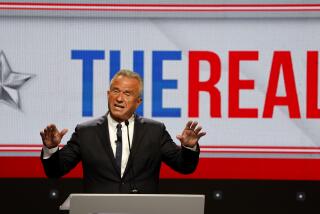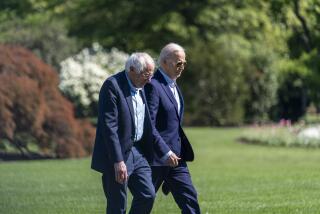Kerry Reaches Out to Independent Rival Nader
- Share via
WASHINGTON — Seeking common ground with a rival many Democrats view as a spoiler, Sen. John F. Kerry on Wednesday urged Ralph Nader to remember their past alliances and to avoid judging him based on the Clinton administration’s record.
The private meeting at Kerry’s campaign headquarters in Washington apparently did not defuse the potential problem that Nader’s independent presidential candidacy could pose to the presumed Democratic nominee.
Kerry did not ask Nader to end his run, according to accounts of the session provided by both sides. Nor did the two candidates discuss any conditions that might persuade Nader to bow out.
But the meeting demonstrated that the Massachusetts senator was reaching out to Nader in a bid to minimize the consumer advocate’s impact on November’s vote. Democrat Al Gore made no such effort in 2000, and Nader won enough votes in Florida and New Hampshire to help tip the election to George W. Bush.
Kerry’s efforts this year, however, could complicate his recent drive to position himself in the political center.
In one exchange, recounted by a Kerry aide who requested anonymity, Nader complained that the Democratic Party had become too cozy with corporate interests.
Kerry replied: “Don’t judge me by the people who preceded me. You may have had a disagreement with [President] Bill Clinton, or [former Vice President] Al Gore, or the Democratic leadership in Congress.... but that’s not me. I have fought with you, I have been with you on a range of issues, and you should judge me by my record in the Senate.”
Nader, in a telephone interview after Wednesday’s meeting, said Kerry’s answer was “a form of music” to his ears.
The Kerry aide said the meeting, which lasted more than an hour, was courteous and focused on areas of agreement between the two men. These included discussions about “corporate responsibility,” “corporate welfare” and “consumer rights,” the aide said.
Echoing that assessment, Nader said in a statement that he and Kerry shared a “common determination” to reduce corporate “subsidies, handouts, giveaways,” to strengthen bar- gaining rights for nonunion workers and to crack down on “corporate crime, fraud and abuse.”
The Kerry aide said there had been no substantive talk about a key area of disagreement: the Iraq war.
Kerry voted for the 2002 congressional resolution that authorized the U.S.-led invasion. He has since accused Bush of botching prewar diplomacy and failing to plan adequately for rebuilding Iraq. But Kerry also has said that as president, he would maintain the U.S.-led occupation as long as necessary to establish a stable Iraqi government.
Nader opposed the war outright and is calling for a speedy U.S. “military and corporate withdrawal.”
Nader said in the interview that he brought up Iraq with Kerry. He said Kerry told him “he has an exit strategy, and he implied he’s going to elaborate on it.”
The Kerry aide denied that account.
Analysts said that even though antiwar voters did not seem to have rallied behind Nader in large numbers, Wednesday’s meeting underscored that prospect.
Kerry could be “worried that [such support for Nader] might materialize down the road,” said Lee M. Miringoff, director of the Marist Institute of Public Opinion.
Tuesday’s showing by Rep. Dennis J. Kucinich (D-Ohio) in Oregon’s presidential primary may have added to those worries. Kerry easily won, with 81% of the vote. But Kucinich, who has continued to campaign in part to stress an antiwar message, got 17% -- by far his best showing in any of this year’s primaries.
By meeting with Nader, Kerry “can build bridges” to antiwar voters, Miringoff said.
Nader said he asked Kerry to do his part to open up the presidential debates in the fall to more than just the major-party candidates. Kerry’s aide said the senator was noncommittal, shunting aside such questions as premature.
Nader and aides to Kerry said the two candidates might meet again.
But Nader acknowledged that Democrats still wanted him to drop his presidential bid.
Although it went unspoken, “that was the omnipresent disagreement in the room,” Nader said.
Through petition drives and alliances with third parties, Nader is seeking to get on the ballot in most states. He has yet to officially qualify in any state.
More to Read
Get the L.A. Times Politics newsletter
Deeply reported insights into legislation, politics and policy from Sacramento, Washington and beyond. In your inbox twice per week.
You may occasionally receive promotional content from the Los Angeles Times.











